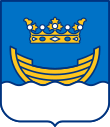Kulosaari Church
| Kulosaari Church | |
|---|---|
Kulosaaren kirkko, Brändö kyrka | |
 Kulosaari Church in 2007 | |
 | |
| 60°11′05″N 25°00′38″E / 60.184694°N 25.010628°E | |
| Location | Kulosaari, Helsinki |
| Country | Finland |
| Denomination | Lutheran |
| Website | www |
| History | |
| Status | Parish church |
| Consecrated | December 1935[1] |
| Architecture | |
| Functional status | Active |
| Heritage designation | Protected |
| Architect(s) |
|
| Style | Jugendstil |
| Completed | 1935 (belfry 1931)[2] |
| Specifications | |
| Number of spires | 1 |
| Materials | Masonry |
| Administration | |
| Parish | Herttoniemi parish[3] |
Kulosaari Church (Finnish: Kulosaaren kirkko, Swedish: Brändö kyrka) is a Lutheran church located in the Kulosaari suburb of Helsinki, Finland.
History
[edit]The Kulosaari parish was established in 1921, and the planning for a church began immediately; however, it took more than a decade before the current church building was completed in 1935.[2][1]
The church is located on top of the tallest hill in Kulosaari, and became soon after its completion known locally as "the Temple on the Hill".[1]
Architecture
[edit]The main church building was designed in Jugendstil style by Bertel Jung,[2] who was also responsible for the overall urban plan of Kulosaari.[4]

The separate belfry, completed four years before the church itself, and standing c. 30 metres (98 ft) from the church building, was initially designed by Armas Lindgren, and completed after his death by his daughter, architect Helena Stenij.[2][1]
The church and its surrounding milieu have been designated and protected by the Finnish Heritage Agency as a nationally important built cultural environment (Valtakunnallisesti merkittävä rakennettu kulttuuriympäristö).[2]
Interior design
[edit]The ceiling and the stained-glass window were designed by Armas Lindgren's son-in-law, artist Antti Salmenlinna.[1]
Bertel Jung's daughter, interior architect Gunilla Jung, designed various interior features including the silver baptismal font, while his niece, textile artist Dora Jung, designed the priest's chasuble in white silk velvet.[5]
See also
[edit]References
[edit]- ^ a b c d e Lillbroända, P.; Vuola, K. (2006). "Kolbe, L.: "Yhteinen saari, yhteinen seurakunta – Kulosaari varustaa kirkon"". Kyyhky ja Karitsa (in Finnish). Helsinki: Helsingin seurakuntayhtymä. ISBN 9789529945719. Retrieved 25 September 2022.
- ^ a b c d e "Kulosaaren huvilakaupunki". RKY.fi (in Finnish). Finnish Heritage Agency. Retrieved 25 September 2022.
- ^ "Kulosaaren kirkko". Helsinginseurakunnat.fi (in Finnish). Lutheran Church in Helsinki. Retrieved 25 September 2022.
- ^ "Jung, Bertel". BLF.fi (in Swedish). Biografiskt Lexikon för Finland. Retrieved 25 September 2022.
- ^ Fernström, Päivi. "Dora Jung 110 vuotta - 110 teosta". Helsinki.fi (in Finnish). University of Helsinki. Retrieved 25 September 2022.

